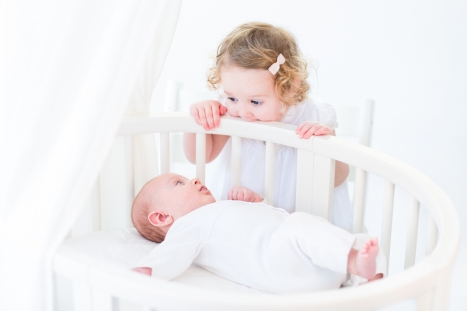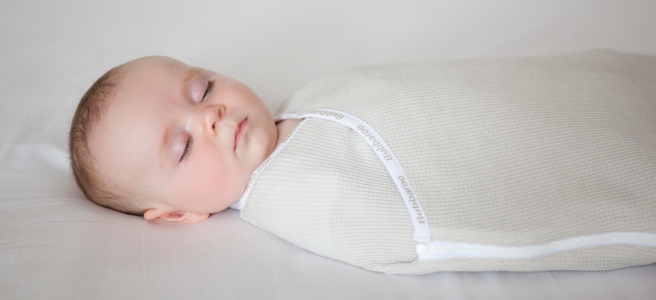Any parent of a baby, is keen to get a good night’s sleep. Not just for themselves, but also for their baby, to grow, develop and enjoy each day and your time together. How do you get this elusive great sleep for babies?
The trick is to set up healthy sleep patterns and habits as your baby develops through each age and stage.
6 Weeks

It will often take a good 6-8 week period to establish feeding your baby. If you are breastfeeding, it takes a while for your supply to establish and manage nutritive breast feeds to ensure your baby is well fed. Like anything related to babies, some babies feed very well from day one, others take a little while to mange this. Feeding your baby is the priority in those early and precious weeks of a new baby.
At around 6 weeks of age, many babies will be going through a growth spurt and the peak of their crying often surfaces around this time. Just get through this few weeks as best you can then start to assess how your baby is managing with sleep.
If you feel that your baby is mostly well rested and you are managing well, then just keep doing what you are doing. However, if you have a baby that is difficult to settle and /or if frequently wakeful, waking less than 1 hour in the day or frequently overnight, then now is a good time to start putting into practice some changes.
Wake your baby at 7am each morning if they are not yet awake. Bring them out to the living area and offer a milk feed. Keep them awake after this feed, wind them, change their nappy, have a little play and a chat.
Then around 45 minutes of being awake, take them to their sleep space and do some wind down or quiet time. Darken the room, dress them comfortably for bed, have a cuddle, song or story then settle them to sleep. We start to encourage you to start feeding your baby separately from going to sleep. During wind down time you may find that your baby starts to drift off to sleep, that is fine. If they are still awake after 5-10mins of quiet time, then place them in their cot or bassinette, and stay with them while they settle to sleep. It is fine to offer a gentle pat, sing to them, just comfort and support them as they go off to sleep. We want them to feel safe and confident going into their cot to help build up a positive connection with their bed.
Aim for your baby to sleep 1.5-2 hours of sleep, so that they are waking rested and hungry, ready to take on a good feed upon waking.
Continue this cycle of one hour awake, then settling to sleep for 1.5-2 hours through daylight hours.Around 6/6.30pm, aim to do some quiet time where your baby sleeps, then settle to sleep for the night. Once they go to sleep for the night, offer feeds and comfort in the room where they sleep when possible to do so.Young babies will often need to feed 3-4 hourly overnight, then wake 6-7am and start the day.
3 Months

Your baby is starting to mature a little now. They can stay awake a little more than 1 hour, more like 1 hour 15- 1.5 hours between sleeps. This is where you may see a little pattern or routine start to develop with their feeds and sleeps.
That you have your baby awake by 7am each morning, offer quiet time around 8.15am, and then settle to sleep by around 8.30am. As your baby has been settling to sleep around this time for some weeks now, their body clock is used to falling asleep at this time and they are needing very little help from you in order to do so. Place your baby awake into their cot, and see if you can step back a little, giving your baby space to see if they can fall asleep without any touch from you. You may hear them grizzle a little, that is your baby trying to fall asleep, leave them to try. If they start to cry loudly, stay close and go and help them fall to sleep in their cot, offering a little less help. For example, instead of patting them to sleep, pat until calm and use your assistance as a calming tool, rather than an essential going to sleep tool.
Aim for 1.5-2 hours of sleep, still aiming that they will wake rested and hungry, read to feed nutritively when they rise. Babies feed well when they are rested and hungry.
Aim for 3 sleeps per day, a morning, lunchtime then late afternoon nap, being awake around 5pm, so that the 6.30pm evening bedtime is protected.
Your baby is still very likely to need to feed overnight a few times.
6 Months

At 6 months of age, your baby is now becoming a little more mobile and taking solid food.
Waking between 6-7 am and needing not only a milk feed but breakfast too. Then around 1.5-2 hours from waking, needing a nap.
At 6 months of age, most babies are still needing 3 sleeps per day, but the late afternoon nap is often very short and might become difficult. Still try to get a short nap, even if it is walk in the pram to prevent them from getting too overtired before evening bedtime at 6.30/7pm.
Around 8 months of age, babies start to be able to stay awake for longer periods of time in the afternoon, and many babies drop down to 2 sleeps in the day. A morning sleep around 9/9.30am and then another around 1/1.30pm in the afternoon. Often needing to be awake by 3/3.30pm so that the evening bedtime is still 6.30/7pm. They may only need 3-4 hours of day sleep now.
6-12 months of age is a very wakeful time for a baby, they are developing physically at a rapid rate, trying to roll, crawl and stand. Babies practice in their light phases of sleep at night, what they are trying to master in the day, and you may notice that they are waking a lot at night. They may not need to feed much or at all, but are waking possibly more than ever before. If you are offering your baby a feed in the room where they sleep just before they settle to sleep overnight, you may find that your baby is demanding to be fed every time that they wake, overnight, regardless of appetite. Start offering the feed out in the living area then settling them to sleep without that feed to help reduce the amount of feeds overnight. If your baby is taking a lot of milk feeds in the night, this will often impact on their appetite in the day. They don’t take full milk feeds and may refuse to just take a taste of solids, so that by night time they are feeling hungry again and a difficult cycle of night feeds starts to be created. Reduce the night feeds to help your baby feel hungry and feed well in daylight hours.
12 Months

Most babies will need two day sleeps until the age of 14-16 months of age. However around 12 months of age you may find that your baby is starting to show readiness to transition to one sleep.
Babies show that they are ready in a variety of different ways, such as
- Finding it difficult to settle to sleep at their usual bedtimes
- Taking a long time to settle or refuse sleep
- Settle well in the day but find the evening difficult or start waking frequently overnight
- Having long periods of wakefulness in the night
- Early morning waking
You may recognize that your baby is transitioning but may find that they are not quite ready to move to one sleep yet. Keep the two day sleeps but offer just a short nap in the morning to help keep the afternoon sleep.
Many babies are now getting themselves upright, and if not already walking, you can see that walking is in the coming months. This also makes nights wakeful as they are practicing this upright moving in the light phases of sleep.
2 Years

At 2 years, one sleep per day somewhere from 12-2pm usually works well. There will be 2 year olds that are not keen to sleep every day and others sleeping up to 3 hours each afternoon. If your child is difficult to settle in the evening or stays awake until very late, the afternoon sleep might be affecting their ability to fall to sleep. Seek to shorten the day sleep to keep a regular evening bedtime, or adapt your evenings to allow for a slightly later bedtime if your child doesn’t cope with a shorter or absent day sleep.
If your baby is happy and sleeping well in a cot, then there is no hurry to get them into a bed. A child climbing out of their cot is at risk of harm getting out of the cot and falling but also being able to freely move around their room and possibly into the rest of the house. This is time to move to a bed or a mattress on the floor for safety. Child proof the room where they sleep and consider a child safety gate at the doorway to keep them from accessing the rest of the house.
2 year olds are very busy, ensure a good wind down period in the room where they sleep before settling them, this helps to slow them down and process the information around them and de-stimulate before being able to fall sleep. We suggest 20 minutes with no technology, a dimly lit room, having stories, songs, cuddles before sleep.
You may wish to check out our new book “5 Steps To Sleep – For Babies and Toddlers” that has a Routine Sampler chapter to guide you with the age of your baby and how to set up a day to promote sleep. Available from www.carolinesangels.com.au
Sweet dreams


